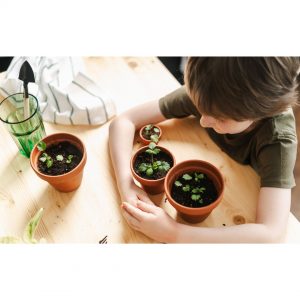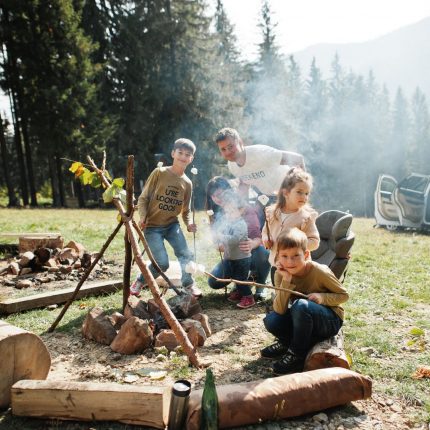
From the Honeypot to the Garden Pot
May 2, 2023Faith-based Resource
I don’t know about you, but I love springtime. I do like summer and fall – maybe not winter so much unless it’s sitting by a warm wood fire, but as I get older I increasingly love spring because I can get back in my garden and orchard. The cold is gone and everything is fresh and new. Spring is a beautiful time of year.
The thing about it though is that it takes work. People might think a small farm is just about putting new seeds in the ground. We do that for the vegetable garden too, but that is only part of what happens. At least around here, it also means working on the vines, brambles, and fruit trees we previously planted and applied the “honeypot principle” of good soil, fertilizer, and extra water. Though we still use the “honeypot principle” in a limited way every spring with existing plants and trees, it’s usually much less than the first year because they are rooted.
Overusing the Honeypot
Notice I say, “It’s usually much less than the first year.” I have to admit that last year I made a serious mistake that is proving quite hard to deal with now. You see, I’ve been babying all my grape arbors for the last three years, trying to get really good, hardy rootstock. What can I say? I like growing fruit. I have to admit that I babied or “honeypotted” them a little too much and all the extra water caused a fungus that turned the grapes into fungus raisins just a week or two before harvest. Supposedly the fungus can come back several years in a row if I don’t get rid of all of it. (You can laugh. I’m almost done crying over last year’s harvest. I can handle it – kinda.)
So, because I took something to the extreme and didn’t stop babying the vines, I may not have a good grape harvest for a while. Would the grapes have made it the first year and even the second spring without all that extra care? Certainly not. They weren’t strong enough or big enough to get their own water and nutrients or handle the summer heat. The “honeypot principle” of sweetening things up for them was effective when used correctly. Overused, it made my semi-mature vines not only weak but sick and diseased. Now I have to prune back all the new growth that the grapes should have grown on this year; scrape back the ground where any leaves or diseased grapes fell; and spray everything with fungicide every couple of weeks. That’s a lot of work for no harvest.
I think you can make the transition between my gardening illustration and homeschooling. The “honeypot principle” works really well. Overused and without balance, it is just as bad as not watering your “sweet little homeschool seedlings.” So what’s the answer?
Finding a Balance
Once you entice something to grow and expand – including children, obviously keep providing the appropriate level of care and even that sweetener to keep them wanting to learn. Start challenging your children though. Without the challenge of chilly spring rains and breezes, hot summer days, and even cool fall weather, you don’t get strong plants or sweeter fruit. If you keep them boxed up too much or left in those nice little plastic garden pots, they look great but have to be coddled for their entire existence.
pots, they look great but have to be coddled for their entire existence.
Garden pots let you keep your plants (and children) where they look pretty on that windowsill, but eventually, they get rootbound and choke themselves out or they wither when you finally try planting them when the weather gets “perfect.” Wait till the “weather” gets perfect and it’s too late. The summer heat gets to them before they can root properly. They just can’t survive because they’ve never been forced to dig in, spread out, or get blown about in the wind a little bit.
There are so many ways to increasingly challenge your children without crushing them. Find something and help them succeed at the challenge. Then do it again with just a little less effort, then a little less effort, etc. over and over until they are meeting whatever challenge it is by themselves. Encourage them if they fail, but let them fail a little. If you haven’t read about what incredible things failure can do for you, please go back and read my previous articles on the subject. Remember that you don’t have to only keep these challenges just in their school work.
Transitioning From the Garden Pot
I can talk in the abstract about these things, but I believe that personal examples often serve the purpose best. In our family we use farm and house chores, working for neighboring farmers and friends, church volunteering, missions trips, etc. As an example, for most of this last week, our nine-year-old daughter has been the one assigned to read a large portion of Scripture every night for Lent in front of the whole family. She mispronounced several words and she had to deal with her big sisters “helping her out,” but she made it through really well. In the end, we praised her as if she’d just stood up in front of her entire Sunday School class. Pretty soon, she’ll be doing that, just like her big twelve-year-old sister who just had to give her testimony in front of her entire youth group, as well as the entire church. In addition, the twelve-year-old will soon be helping tell Bible stories for a Sunday School class of 50 kids just like her sixteen, eighteen, and twenty-two-year-old sisters do or running the class as her older brothers do. When the oldest girl gets too busy and forgets to study her lessons properly, she has to deal with her older brothers. Her brothers have to deal with the program director.
All of them make mistakes in different ways at different times. Sometimes they’ve come home from work or other events and had to study very late into the night Saturday night so they are ready for whatever part they are responsible for at church. For the older ones, it means they lose sleep and they sometimes miss out on things they really want to do, but instead, they keep their promise and study. You can see that they are facing increasing and quite substantial challenges that make them stronger and stronger and more effective.
I’m sure you can see the pattern. Entice your children to thrive and start setting them out in the sunlight of challenge a little bit at a time, then take them out of that garden pot and put them in a place where they can spread their roots. If you do, they will grow. They will grow strong. They will bear fruit. Isn’t that what you want?
More About the Author:
 Gabriel is a former homeschooled missionary kid and homeschooling father who adores his wife, children, and grandchildren. He is currently rebuilding a 130-year-old homestead, writing a historical fiction book on character for young people, and mentoring young men. He is a former U.S. Marine Corps Combat Correspondent, Army National Guard Photographer, and U.S. Army Deputy Public Affairs representative and holds a Bachelor of Arts in Communication. He lived in Central America during Junior High and served on military short and long-term assignments across the U.S. and in half a dozen countries, including Iraq during his military career. Besides his deep faith and his family, his passion is writing and developing young men into capable steward leaders.
Gabriel is a former homeschooled missionary kid and homeschooling father who adores his wife, children, and grandchildren. He is currently rebuilding a 130-year-old homestead, writing a historical fiction book on character for young people, and mentoring young men. He is a former U.S. Marine Corps Combat Correspondent, Army National Guard Photographer, and U.S. Army Deputy Public Affairs representative and holds a Bachelor of Arts in Communication. He lived in Central America during Junior High and served on military short and long-term assignments across the U.S. and in half a dozen countries, including Iraq during his military career. Besides his deep faith and his family, his passion is writing and developing young men into capable steward leaders.
Additional Homeschool Resources
To Be or Not to Be: Helping the Struggling Student
To Be or Not to Be: Learning From Failure Pt. 2
To Be or Not to Be: Learning From Failure Pt. 3
Latest Posts

As homeschooling continues to grow in popularity, more parents are taking on the challenge of providing a comprehensive education that not only meets academic standards but also prepares their…
Read more >
June has come and gone, and summer is in full swing! Whether you're traveling this summer or staying close to home, we hope you're enjoying this time with your family. We wanted this month's…
Read more >
Summer is an all-around favorite season for most people. In the U.S., it’s even more exciting for many of us since we get to celebrate Independence Day! The Fourth of July is a wonderful…
Read more >

